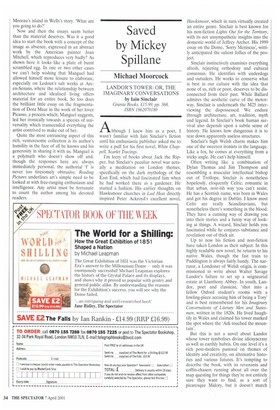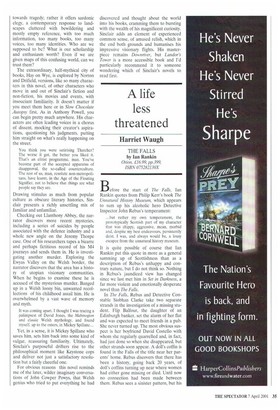Saved by Mickey Spillane
Michael Moorcock
LANDOR'S TOWER: OR, THE IMAGINARY CONVERSATIONS by lain Sinclair Granta Books, £15.99, pp. 368, ISBN 1862070180 Although I knew him as a poet, I wasn't familiar with lain Sinclair's fiction until his enthusiastic publisher asked me to write a puff for his first novel, White Chappell, Scarlet Tracings.
I'm leery of books about Jack the Ripper, but Sinclair's peculiar novel was actually a meditation on London themes, specifically on the dark mythology of the East End, which had fascinated him when he had worked there as a gardener. He started a fashion. His earlier thoughts on Hawksmoor churches in Lud Heat directly inspired Peter Ackroyd's excellent novel,
Hawksmoor, which in turn virtually created an entire genre. Sinclair is best known for his non-fiction Lights Out for the Territory, with its not unsympathetic insights into the domestic world of Jeffrey Archer. His 1999 essay on the Dome, 'Sorry Meniscus', wittily anticipated the salient follies of the project.
Sinclair instinctively examines everything afresh, rejecting orthodoxy and cultural consensus. He identifies with underdogs and outsiders. He works to conserve what is best in our culture with the idea that none of us, rich or poor, deserves to be disconnected from their past. While Ballard admires the aesthetic curve of the motorway, Sinclair is underneath the M25 interviewing the dispossessed. We endure through architecture, art, tradition, myth and legend. In Sinclair's book human survival also depends upon a subtle sense of history. He knows how dangerous it is to tear down apparently useless structures.
Sinclair's high Welsh charm makes him one of the sweetest ironists in the language. Like a fox, he comes at everything from a tricky angle. He can't help himself.
Often writing like a combination of Dylan Thomas and Jim Thompson and resembling a muscular intellectual bishop out of Trollope, Sinclair is nonetheless hopelessly, eloquently Celtic; romantic in that urban, noir-ish way you can't resist. He has a Scottish name, was born in Wales and got his degree in Dublin. I know most Celts are really Scandinavians, but nonetheless there's something in the blood. They have a cunning way of drawing you into their stories and a funny way of looking at things. A wizard, Sinclair holds you fascinated while he conjures substance and revelation out of thick air.
Up to now his fiction and non-fiction have taken London as their subject. In this highly readable new novel, he returns to his native Wales, though the fast train to Paddington is always fairly handy. The narrator, a Londoner of Welsh origin, is commissioned to write about Walter Savage Landor's failure to set up a seigneurial estate at Llanthony Abbey. In youth, Landor, poet and classicist, 'shot into a fellow Oxford student's rooms with a fowling-piece accusing him of being a Tory' and is best remembered for his Imaginary Conversations of Literary Men and Statesmen, written in the 1820s. He lived haughtily in Wales and claimed his tower marked the spot where the 'Ark touched the mountain'.
But this is not a novel about Landor whose tower symbolises divine idiosyncrasy as well as earthly hubris. On one level it's a rich post-modern pastoral on themes of identity and creativity, on alternative histories and various futures. It's tempting to describe the book, with its revenants and coffin-chasers running about all over the map questing for things they're not entirely sure they want to find, as a sort of picaresque Malory, but it doesn't march towards tragedy; rather it offers sardonic elegy, a contemporary response to landscapes cluttered with bewildering and mostly empty reference, with too much information, too many books, too many voices, too many identities. Who are we supposed to be? What is our scholarship and enthusiasm worth? Even if we are given maps of this confusing world, can we trust them?
The extraordinary, half-mythical city of books, Hay on Wye, is explored by Norton and Drifield, versions, like so many characters in this novel, of other characters who move in and out of Sinclair's fiction and non-fiction, his movies and events, with insouciant familiarity. It doesn't matter if you meet them here or in Slow Chocolate Autopsy first. As in Anthony Powell, you can begin pretty much anywhere. His characters are often leading voices in a chorus of dissent, mocking their creator's aspirations, questioning his judgments, putting him straight on what's really happening on the street.
You think you were satirising Thatcher? The worse it got, the better you liked it. That's an elitist programme, man. You've become part of the accepted apparatus of disapproval, the so-called counterculture. The rest of us, man, resolute non-metropolitans, have learnt, in the Age of the Floating Signifier, not to believe that things are what people say they are.
Drawing stimulus as much from popular culture as obscure literary histories, Sinclair presents a richly unsettling mix of familiar and unfamiliar.
Checking out Llanthony Abbey, the narrator discovers more recent mysteries, including a series of suicides by people associated with the defence industry and a whole new angle on the Jeremy Thorpe case. One of his researchers tapes a bizarre and perhaps fictitious record of his M4 journeys and sends them in. He is investigating another murder. Exploring the Ewyas Valley on the Welsh border, the narrator discovers that the area has a history of utopian visionary communities. When he begins to examine these he is accused of the mysterious murder. Banged up in a Welsh loony bin, unwanted recollections of his childhood assail him. He is overwhelmed by a vast wave of memory and myth.
It was coming apart. I thought I was tracing a palimpsest of David Jones, the Mabinogian and classic Welsh mythology, and found myself, up to the oxters, in Mickey Spillane...
Yet, in a sense, it is Mickey Spillane who saves him, sets him back into some kind of vulgar, reassuring familiarity. Ultimately, Sinclair's purposeful drifters rise to the philosophical moment like Keystone cops and deliver not just a satisfactory resolution but a fairly cheerful one.
For obvious reasons this novel reminds me of the later, wilder imaginary conversations of John Cowper Powys, that Welsh genius who tried to put everything he had discovered and thought about the world into his books, cramming them to bursting with the wealth of his magnificent curiosity. Sinclair adds an element of experienced common sense, of amused relish, which in the end both grounds and humanises his impressive visionary flights. His masterpiece remains Downriver, but Landor's Tower is a more accessible book and I'd particularly recommend it to someone wondering which of Sinclair's novels to read first.



























































 Previous page
Previous page